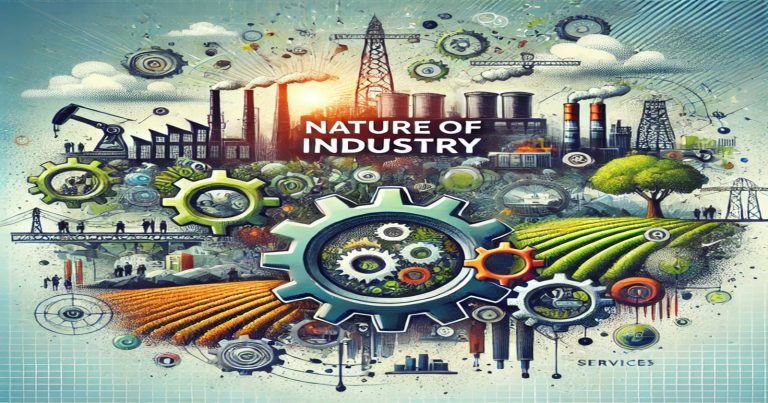The nature of industry plays a very important role in shaping economies, fostering innovation, and meeting societal needs. Industry, as one of the basic economic activities, involves the production and processing of goods and services. This article explores the critical aspects of industries, including their definitions, types, and importance. In addition, the article incorporates some of the most crucial SEO keywords to make the topic more understandable. With technological and societal changes, industries remain at the heart of development.
What is Industry?
Industries refer to economic activities that involve the extraction, production, and distribution of goods or services to meet consumer needs. These activities span across various sectors, including manufacturing, technology, and services, forming the backbone of modern economies.
Industries are broadly categorized on the basis of processes involved in them. To be specific, there are primary, secondary, and tertiary sectors of industries. The primary sector emphasizes extracting natural resources. Secondary sectors transform raw into finished products. Tertiary sectors related to retail, entertainment, and finance services.
Nature of Industry
The nature of industry is multifaceted, shaped by its scope, structure, and operations. Industries are distinguished by their diverse characteristics and their roles in driving economic development.
Production-Oriented Industries
Industries focus on making goods and providing services. These activities include mining, manufacturing, and delivering services to customers. Each industry has specific goals and uses its resources to meet them effectively. The production process ensures people get the products they need in their daily lives.
These industries work to improve efficiency and meet growing demand. Businesses invest in better tools and methods to increase output. This constant improvement ensures products are available to more people while keeping costs low.
Resource-Dependent Industries
Industries depend on natural, human, and financial resources. They use these resources to create products and run their operations. For example, factories need raw materials, skilled workers, and funds to function effectively. The balance of resources ensures smooth operations.
Efficient resource management helps industries reduce waste and boost productivity. Companies that use resources wisely often achieve better results, benefiting both the economy and the environment.
Dynamic Evolution of Industries
Industries constantly change due to new technology and global trends. Businesses adopt new tools and strategies to stay competitive. These changes create better products and services for consumers.
Globalization also connects industries worldwide, encouraging growth and collaboration. As consumer needs change, industries quickly adapt, offering modern solutions to stay relevant.
Interconnected Industrial Processes
Industries rely on a chain of linked processes. For instance, raw materials are transformed into products, which are then distributed to customers. Every step is essential and ensures the final product is of quality.
These interconnected processes foster teamwork and efficiency. Companies that optimize their operations provide better products sooner, meeting the expectations of their customers.
Industries as Economic Drivers
Industries play a big role in the economy. They provide jobs, boost GDP, and encourage innovation. By creating products and services, industries improve living standards and contribute to national progress.
Strong industries support communities by generating income and opportunities. Their success helps nations grow, making them vital for economic health and development.
Types of Industry
Industries are classified based on their activities and contributions to the economy. This section explores the major types of industries in detail.
Primary Industries
Primary industries focus on extracting and harvesting natural resources. These industries include agriculture, fishing, forestry, and mining. They form the base of the economy by providing essential raw materials. Without primary industries, other sectors cannot create finished goods or services.
These industries rely on nature for their resources. Workers in this sector use tools and techniques to collect resources sustainably. Primary industries ensure a steady supply of raw materials like food, timber, and minerals, supporting the growth of other industries and the economy.
Secondary Industries
Secondary industries turn raw materials into finished or semi-finished goods. Examples include construction, automotive manufacturing, and textile production. These industries bridge the gap between raw resources and ready-to-use products for consumers.
This sector uses machinery and skilled workers to add value to raw materials. By creating goods like cars, clothing, and buildings, secondary industries play a crucial role in industrial and economic development, improving people’s lives with essential products.
Tertiary Industries
Tertiary industries focus on providing services instead of goods. Banking, healthcare, education, and retail are key examples of this sector. These industries directly serve consumers, meeting their daily needs and improving their quality of life.
In providing expertise and infrastructure, a service sector propels other businesses. Professionals that include teachers, doctors, sand hopkeepers, help society run smoothening. Tertiary industries also increase economic growth with the creation of jobs and innovation in terms of service provision.
Importance of Industry
The role of industries extends beyond economic contributions. They serve as a linchpin for societal development and technological progress.
- Economic Growth: Industries are the backbone of economic growth. They contribute significantly to the national GDP and help generate income for individuals and businesses. A strong industrial sector boosts trade and investments, creating a stable and thriving economy. This growth also supports the overall development of a nation.
- Employment Opportunities: Industries create jobs across various sectors, reducing unemployment and improving living standards. From factory workers to skilled professionals, industries offer roles for people with different skills. By generating a steady income for workers, industries strengthen families and communities, fostering economic stability and social well-being.
- Technological Innovation: Industries drive progress by promoting research and innovation. They develop new technologies and improve production methods to meet modern demands. These advancements not only make goods better and cheaper but also improve efficiency. Industries ensure that societies keep up with the fast-changing world.
- Global Competitiveness: A strong industrial sector makes a country more competitive in the global market. It improves exports, attracts foreign investments, and builds a positive reputation worldwide. By producing high-quality goods and services, industries help nations achieve economic strength and global influence.
- Infrastructure Development: Industrial growth leads to better infrastructure like roads, bridges, communication networks, and utilities. These improvements make daily life easier for people and businesses. Industries also encourage urban development, creating modern cities and improving access to essential services for everyone.
Nature of Industry FAQs
What is the nature of industry?
The nature of industry refers to its characteristics, structure, and processes involved in producing goods and services.
Which of the following are industries involved in extraction processes of natural resources?
Mining, forestry, fishing, and agriculture directly engage in the extraction processes of natural resources.
What is the nature and scope of industrial economics?
Industrial economics studies the nature of industrial structure, market flow, and interactions between industries and economies to realize optimal resource usage and productivity.
How does the nature of industrial relations affect the business?
The nature of industrial relations affects harmony, productivity, and employee satisfaction which impacts the bottom line of any business.
How do industries support economic development?
Economic growth: Industries support the economy by raising employment, facilitating innovation, and making a nation more competitive internationally.


